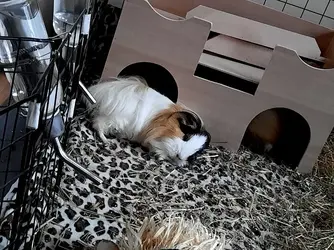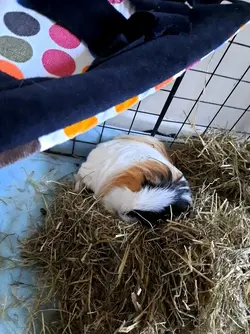Hi!
Stone operations in sows are actually one of the easier ops with a very good recovery rate. I have had a spate of stones in my piggies in 2012-13 when I experimented with the diet and for a while got the calcium ratio in the diet exactly wrong. But all piggies have made it safely through their operations. Even Ceri, who was found to have a rabbit sized stone that didn't cause any symptoms until she suddenly started losing weight like nobody's business. She was a very borderline 520g at coming up to 5 years - but she made it through the op and was back to 700g within two weeks of op.
My Minx did make it through two bladder stone ops in 2006 and 2007; at a time when we knew a LOT less and when there was very little (and not exactly accurate) information about diet and bladder stones around. She is by far not the only piggy I know that has had more than one successful bladder op. And things have thankfully moved on a whole lot since then!
But it all depends on how good and confident your operating vet is.
Here is our recommended vets locator:
Vet Locator
Here are post-op care tips:
Tips For Post-operative Care
However, you want to review your diet:
- Most of the calcium in the diet comes via the water. Filtering it is the single most important measure you can take.
- Pellets contain weight by weight more calcium than the veg highest in calcium - and that goes even for the no added calcium ones. Please do not feed more than 1 tablespoon per piggy per day max. Pellets also contain mostly filler and much less fibre compared to hay, so they should be more of a daily treat than a large part of the diet.
- Hay, hay and more timothy hay - the more hay your piggy eats, the better. Fresh grass is high in vitamin C; hay also contains it. It is the reason why piggies never had the need to make their own in the first place. Guinea pig guts are laid out to process grass/hay fibre optimally with two runs through the gut. The growth rate of the crucial grinding molar and premolar teeth at the back of the mouth has evolved to be perfectly in sync against the very abrasive silica in grass and hay as their main diet. Just because hay and grass are not part of a human diet, they have for far too long just been treated as a dietary non-entity. Hay is the single most important health promoting and life prolonging food that guinea pigs can eat unlimited amounts of (ca. 80%).
- Veg: Please don't overfeed. Opt for a mix of green leaves and high fluid green veg like cucumber and a little high trace element food like fresh herb plus a slice of pepper to mimic a natural diet. If your stone piggy is not a good drinker (many aren't), the up the amount of fluid rich veg a little to encourage stronger pees that wash any calcium and bacteria out and help minimising the build-up of further stones.
Stay off root veg and grains (including sweetcorn).
Here are our detailed diet recommendations; you can find them under special diets:
Long Term Balanced General And Special Needs Guinea Pig Diets
Please be aware that it takes several weeks before any diet changes work through the body. The calcium absorption process is a complex and not yet fully understood one. Unless you grossly overfeed calcium, there are usually other factors playing into the formation of bladder stones. Diet is just the one factor where we can make a real difference. Until earlier this month, I haven't had any bladder stones for 7 years in the 40-50 piggies have have come here to live with me in meantime.
All the best! Unfortunately for you, there is no alternative to an operation but I can promise you that the sheer relief from the pain of the stone usually contributes to a quick recovery once the healing process is getting seriously underway after a couple of stones.
It takes a leap of faith after a bad experience, but this is a very different beast.


